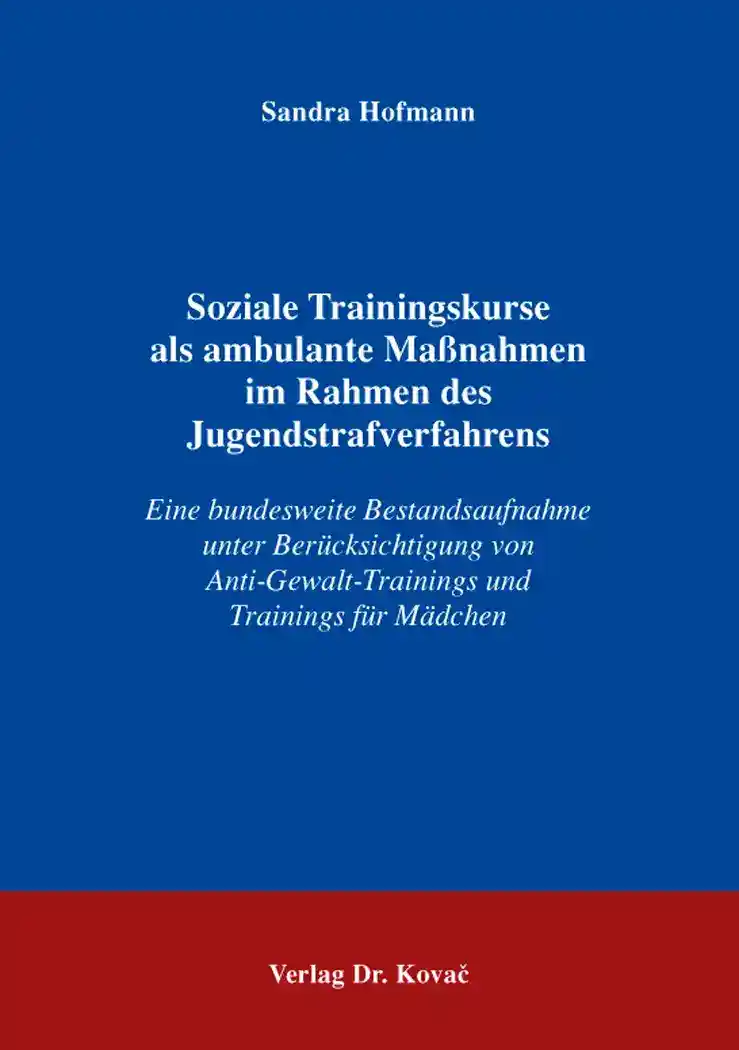Sandra HofmannSoziale Trainingskurse als ambulante Maßnahmen im Rahmen des Jugendstrafverfahrens
Eine bundesweite Bestandsaufnahme unter Berücksichtigung von Anti-Gewalt-Trainings und Trainings für Mädchen
Hamburg 2014, 336 pages
ISBN 978-3-8300-7584-4 (print) |ISBN 978-3-339-07584-0 (eBook)
About this book deutschenglish
Since the early 1990s, juvenile delinquency and in particular violent behaviour in young people have been at the centre of public, criminal policy and academic debates. These discussions have been prompted primarily by rises in reported offences involving physical injury among young men and, to a lesser extent, young women. Although police crime figures indicate that the number of suspects committing violent offences has been declining since 2010, more and more projects aimed at preventing violence are being initiated in order to address the issue. Social skills training courses, including violence prevention training, are widely used and are implemented by independent youth assistance associations and the youth court assistance service in accordance with Section 10 (1) No. 6 of the Youth Courts Law (Jugendgerichtsgesetz – JGG). A national review of social training courses in Germany – with information on the structure, organisation and design of this type of training – was most recently carried out by Dünkel et al. (1998) for the years 1991 to 1993. The book builds on the study conducted by Dünkel et al. and updates it with a focus on the year 2006. Providers of social training courses in Germany were questioned verbally and in writing in order to obtain information about target groups, objectives, conceptual frameworks, the skills and qualifications of staff, and financing arrangements for the training. The review also outlines the differences between social training that is not geared towards any particular offence and training that focuses specifically on violence prevention, together with training courses for girls, boys and mixed-sex groups. Respondents were questioned on compliance with quality standards and the use of self-evaluation methods, and also on the evaluation of the training initiatives. A total of 412 initiatives from 311 social training course providers were included in the study. Since there has been very little evaluation to date of social training courses and violence prevention training aimed specifically at girls, a process evaluation of “coolness training” for girls was also conducted in a small number of cases. Trainers and training course participants were questioned verbally and in writing, and public prosecutor files were inspected to examine participants’ subsequent conduct during their probationary period. On this basis, conclusions can be drawn about the success of the social training and about changes in the attitudes and behaviours of participants. The study also provides information on how the training is accepted by participants and analyses the need for special training courses for violent and potentially violent girls.Keywords
Anti-Aggressivitäts-TrainingAnti-Gewalt-TrainingGewaltpräventionJugenddelinquenzJugendgerichtsgesetzJugendkriminalitätKriminologieMädchendelinquenzMädchenkriminalitätSozialarbeitSoziale TrainingskurseIhr Werk im Verlag Dr. Kovač

Möchten Sie Ihre wissenschaftliche Arbeit publizieren? Erfahren Sie mehr über unsere günstigen Konditionen und unseren Service für Autorinnen und Autoren.
